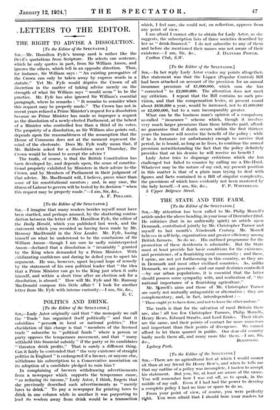LETTERS TO THE EDITOR.
THE RIGHT TO ADVISE A DISSOLUTION.
[To the Editor of the SPECTATOR.]
6IR,—Mr. Hamilton Fyfe's trump card is rather like the Devil's quotations from Scripture. He selects one sentence,
which he only quotes in part, from Sir William Anson, and ignores the others, which tell in an opposite direction. Thus, for instance, Sir William says : "An existing prerogative of the Crown can only be taken away by express words in a statute." Yet Mr. Fyfe would deprive the Crown of all discretion in the matter of taking advice merely on the strength of what Sir William says "would seem" to be the practice. Mr. Fyfe has also ignored Sir William's essential paragraph, where he remarks : "It remains to consider when this request may be properly made." The Crown has not in recent years refused a Prime Minister's request for a dissolution because no Prime Minister has made so improper a request as the dissolution of a newly-elected Parliament, at the behest of a Minister who controlled less than a third of its votes. The propriety of a dissolution, as Sir William also points out, depends upon the reasonableness of the assumption that the House of Commons does not at the moment represent the mind of the electorate. Does Mr. Fyfe really mean that, if Mr. Baldwin asked for a dissolution next Thursday, the Crown would be bound to accept the advice ?
The truth, of course, is that the British Constitution has been developed by, and depends upon, the sense of constitu- tional propriety exhibited by Ministers in their advice to-the Crown, and by Members of Parliament in their judgment of that advice. Mr. MacDonald will, I believe, prove wiser than some of his constitutional mentors ; and, in any case, the fitness of Labour to govern will be tested by its decision " when this request may be properly made."—I am, Sir, &c.,
A. F. POLLARD.






































 Previous page
Previous page